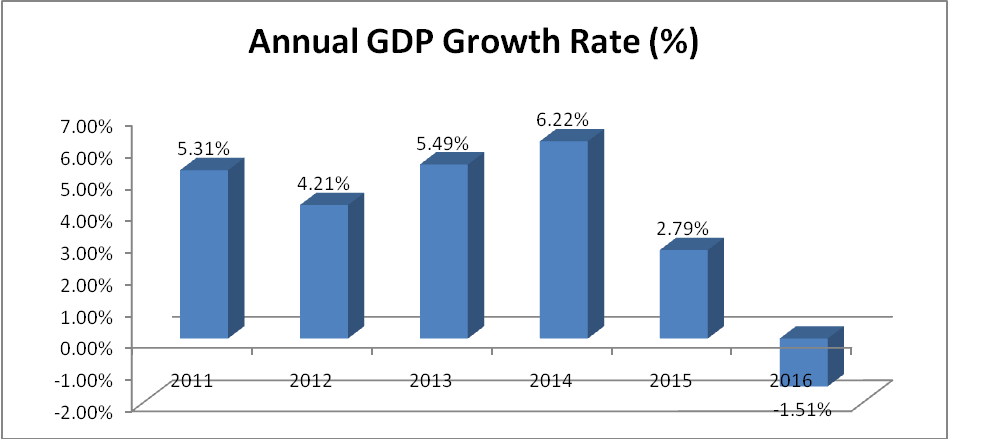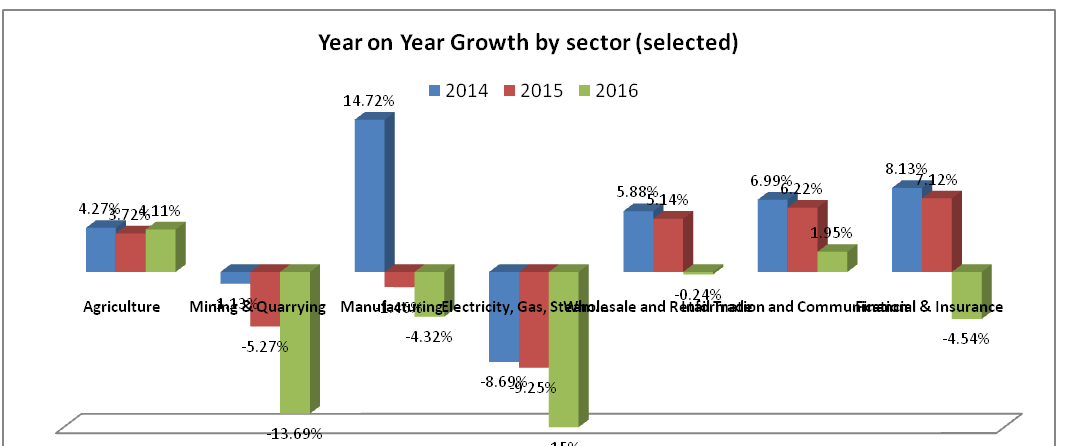BUSINESS ESSENTIALS Vol. 4, No.9
Dear Esteemed Member,
The National Bureau of Statistics (NBS) recently released Quarter 4 and full year 2016 data on the Gross Domestic Product (GDP), which confirmed Nigeria’s economic contraction in 2016. Even though macroeconomic indices remained weak, some positives were, however, also emerging. We had spared time to review the developments and x-rayed critical information that might be useful for business.
In a similar vein, we highlighted the Role of Management in Industrial Relations and shared a recent Press Release of NECA saluting the recent action of the Acting President on his decline of Assent to the National Lottery Bill. These and information on recent Demand Notices by FIRS on Property Valuation concludes our features for the week.
Have a pleasant reading.
Timothy Olawale
Editor
In this Issue:
- Overview of Gross Domestic Product (GDP) in 2016
- The Role of Management in Industrial Relations
- FIRS Issues Demand Notices Based On Property Valuation
- Labour & Employment Law: Collective Agreement (National Union of Hotels and Personal Services Workers (NUHPSW) (For and on behalf of the NUHPSW Warri Branch; NUHPSW Escravous/Swamp Branch and NUHPSW Lagos Branch) vs. Outsourcing Services limited (2014) 40 N.L.L.R. Pt 121, P.82. NIC
- Upcoming Training Programmes
Overview of Gross Domestic Product in 2016
In the fourth quarter of 2016, the nation’s Gross Domestic Product (GDP) contracted by -1.30% (year-on-year) in real terms, from N18,533.75 billion in Q4 2015 to N18,292.95 billion in Q4 2016. This decline was less severe than the decline recorded in the previous quarter, of -2.24%, but was nevertheless lower than the growth rate recorded in the final quarter of 2015, of 2.11%. Quarter-on-quarter, real GDP increased by 4.09%, which partly reflects seasonal factors as well as a rise in the general price level.
For the full year 2016, therefore GDP contracted by -1.51%, indicating real GDP of N67,984.20 billion for the year. This contraction reflects a difficult year for Nigeria, which included weaker inflation-induced consumption demand, an increase in pipeline vandalism, significantly reduced foreign reserves and a concomitantly weaker currency, and problems in the energy sector such as fuel shortages and lower electricity generation.
This means in dollar terms, the economy retains its position as the largest economy in Africa, with GDP at USD 337billion. In real terms however, the narrative is not as compelling. The economy recorded a contraction in growth by 1.5% y/y – the result of a mix of factors: foreign exchange and fuel shortages, intermittent power outages, delayed fiscal stimulus and lack of clarity on the policy environment.
While the non-oil sector remained the major driver of the economy (91.6% of GDP), its resilience was called into question by a myriad of structural shocks. Real growth in the sector was -0.2% y/y for the first time in recent years, well below the 5-year average of 5.1%. As expected, the oil sector contracted sharply by 13.7%, a reflection of lower oil prices and massive shortages in oil production. Agriculture, Information and Communication, and Education emerged as the best performing sectors with respective y/y growth of 4.1%, 3.9% and 1.4%, while the Power, Mining and Real estate sectors were the worst hit, declining y/y by 15.0%, 13.6% and 6.9% respectively.
Since the rebasing of GDP series, the economic structure of Nigeria has shown increased diversification with oil becoming less relevant (8.4% of GDP), but only from an activity perspective. The oil sector remains the predominant source of fiscal and export revenues. This suggests an increasing linkage between the oil and non-oil sectors in particular, through the exchange rate channel.
OPINION
We anticipate a gradual but weak recovery of economic activities and a further decline in per-capita GDP. This growth is expected to be driven by the following:
- Moderate improvement in crude oil production to an average of 1.8mbpd, up from 1.7mbpd in 2016, as attacks on oil and gas infrastructure moderate,
- Stabilisation of oil prices at an average of US$55/bbl supported by the implementation of OPEC’s output freeze deal and,
- Improved liquidity in the foreign exchange market.
Improvements in oil revenues should support public spending and positively impact the current account balance. This should increase foreign exchange liquidity to support a more flexible exchange rate regime thus narrowing further, the gap between the official and parallel market rates.
The Role of Management in Industrial Relations
Industrial Relations, in its conceptions and scope varies with organisations and it depends on the issues which each side of the relations- management and the Union- consider as crucial for its efficient performance. The two sides, at any given time, operate within the legal framework determined by the character and posture of the government of the day. As governments vary in their complexions and actions, we must expect changing conception and interpretations of industrial relations issues.
The point being made is that industrial relations is a dynamic process whose features and functioning are emergent phenomena of the interplay of actions among the Union, the management, and the government.
One tends to agree with Richard Hyman that each management must decide on its definition (of industrial relations) after agreeing to general conception. And the general conception is that industrial relations should be democratic and that issues should be resolved through collective bargaining to ensure industrial peace. Management must change its various strategies for dealing with issues in industrial relations. As issues, unions and government change, management must adapt its strategies for survival accordingly.
What are the elements in our industrial relation system of which management, as a category, constitute an important and indispensable part:
- Employment problems and employment security;
- Conditions of work: hours of work, shifts, holidays etc;
- Remuneration: level, frequency, methods of wage payments and wage fixing;
- Labour and employer grievances and disputes;
- Levels of production and efficiency;
- Safety, health and welfare at work;
- Social security: sickness and old age benefits, maternity leave, employment injury compensation;
- Employee development, training, upgrading and promotion.
It can be seen that some of, if not all, the issues concern not only management and unions- the two central actors in the industrial relation system- but also the government and the community at large. One of the problems confronting management is where to draw the line between issues that are supposed to be part of an industrial relations system and issues that are peripheral to it. In our type of political, social and economic system, the line is sometimes difficult to draw. What, for example, should be the area of social responsibility of a business community? Views differ on this. Whatever position a company takes, it still has to contend with the problems of the scope and content of industrial relations.
It is perhaps to settle issues of this nature that certain procedures and institutions are set-up as part of an industrial relation system. Such arrangements include, among others, consultation, negotiation, and arbitration procedures. Industrial Arbitration Panel, Industrial Court and various laws governing relations between management and the Union. It is the responsibility of management to re-examine constantly the industrial relations system and to attempt to influence the system for its own benefit. Management has the right to do this.
Just as war is too important an issue to be left to the Generals alone or politics too serious and important to be left to the politicians alone, so industrial relations is too serious an issue to be left to the government of the day alone without a concerted effort by management to influence its nature and direction. It must of course be realised that the Unions and the government cannot leave industrial relations to management alone. This situation calls for some sort of negotiated order in the interest of the system.
Management must direct its attention, whatever its conception of industrial relations to these two relevant issues:
- Productivity
- Government’s Involvement in Industrial Relations
- Productivity: The ultimate objective of the industrial relations system is productivity. The elaborate arrangement for resolving industrial conflicts is obviously aimed not just at ensuring industrial peace per se, but industrial peace that can contribute to the achievement of organisational goals. It can be argued therefore that the role of management in industrial relations is tantamount to its role in enhancing productivity.
It is agreed that both sides of industry must contribute to productivity; nevertheless, it is more of management’s headache than workers’ concern. Management as a category and as individual must set examples of productivity. Managerial leadership must go beyond using others to achieve result; it should include active participation by management in achieving desired productivity.
It is not uncommon for management to set-up a self- regulating production and administrative system which allows management to devote time to extraneous and sometimes irrelevant issues. A situation like this is likely to be viewed as evidence of good management since the system is capable of regulating itself with minimum supervision by management. On the contrary, workers may see the declining involvement of managers as evidence of laziness, exploitation and lack of commitment. Workers may then start to emulate their managers. This situation is likely to arise where managers devote extra time, created through a self-regulating system, to their own private problems and businesses. Management should, at all times, demonstrate openly its own commitment to increased productivity and not indulge too frequently on the popular “received opinion” that “Nigerian workers are unproductive”.
In this connection, it is instructive to examine the current view on the attitude of Nigerian to work, their productivity, and management’s role in ensuring the right attitude to work. If we were to judge by the remarks of significant people in this country, there is no doubt that the conclusion has to be that attitude to work and the actual performance of Nigerian workers are not conductive to increased productivity. Perhaps, the most serious problem for management is how to secure increased productivity in a situation of escalating cost of labour. Why is it that increasing cost of labour is not matched by the expected rise in productivity? What can management contribute to arrest the situation?
There are well-known explanations for declining productivity among workers. They include: poor motivation, obvious ineptitude, laziness, bad training, government’s intervention in collective bargaining, obnoxious legislation protecting workers, inability of trade unions to control their members, etc.
Focusing on the prevailing social, cultural and political milieu which can be aptly described as “ anomic” as a major contributing factor to the much talked-about poor attitude to work and low productivity. It appears that there is a break-down of work ethics, norms and standard necessary for self-sustaining growth. For some reasons, there is a general belief that working hard in “other people’s job” does not pay. This is also related to the popular belief that salary/wage earners can never “make it in life” if they rely solely on their salaries and wages. This belief is the basis of various malpractices in and outside many organisations. Divided interests, unwillingness to work hard, disloyalty, even pilfering of organisational products are traceable to this belief.
Increasingly, business organisations are affected by norms and beliefs derived from the wider society. In effect contemporary problems of management are traceable to beliefs, behaviours and interactions in the wider society. It is just not enough for management to recognise the implications of this situation for our industrial relations system, but must try actively and persistently to reduce the level of business and political immorality in the wider society.
- Government’s Involvement in Industrial Relations: The general view is that government’s intervention with particular regards to wage fixing and other conditions of service through wages tribunal strike at the very root of a democratic industrial relations system which is supposed to be based on voluntarism. Of course, it is becoming increasingly clear that government intervention is inevitable. What is generally complained about is the chaotic and inconsistent intervention of government.
The popular view is that government’s position at any given time cannot be predicted. Sometimes it appears that the government is on the side of workers when it is presumed it should be on management’s side, at other times on the side of management, and sometimes on neither side. It is even alleged that government often violate its own law by not enforcing it- for example the “ No Work No Pay” legislation.
Whatever opinion one holds on this issue, it appears that government intervention will continue unabated in our type of social, economic and political system, The government constitutes the single largest employer of labour in the country. As an employer, government’s action cannot be described as an unwelcome intervention. Even with regards to the “private sector”, government cannot but interfere because of its dominant role in the economy. The private sector in Nigeria is too dependent on government patronage to be really private. Perhaps the time has come to talk more of the public and foreign sectors rather than public and private.
If government intervention is likely to continue unabated, what role is management expected to play? We suggest that management should find a way of containing such interventions in industrial relations issues. It can only do this successfully if it can gain the confidence of the workers. In a democratic society, it should be possible for both management and the union to act together in opposition to government over issues which are beneficial to them. Such issues of common interest on which management and the union may act together to influence the government include; humanisation of work, the problem of ageing in work situations, pensions, and the quality of retirement life.
To further discuss the role of management in industrial relations, we shall look at the following:
- The need for management to continue to adapt its various strategies to the changing political, social and economic environment.
- In our type of society, the shifting nature of the boundary between issues falling within industrial relations systems and outside it must be recognised. The social responsibility of management cannot be static and definite, it must be conceived as negotiable
- Management must continue to re-examine the industrial relations system with the sole objective of influencing it for its own benefit. It is too important an issue to be left to government alone.
- Management must set examples through active participation in programmes that improve productivity. It must demonstrate openly its commitment to increased productivity.
- The “anomic” nature of our political, social and cultural milieu from which emanates the prevailing attitude to work and low productivity.
- The possibility of management and union acting in concert-even if in opposition to government, on issues of common interest.
- The inevitability of government intervention in industrial relations. Management must recognise this, but at the same time, it must attempt to contain the situation.
Conclusion
Management is usually very innovative and dynamic with respect to changing market situation since this is the only way it could survive in a competitive environment. Production, sale, and marketing assumptions are constantly re-examined for effective performance. It seems that with regards to personnel and other industrial relations problems, management tends to be a little conservative particularly with regards to the assumptions on which industrial relations is anchored.
The notions of voluntarism and collective bargaining in industrial relations need re-examination in the context of a developing economy.
We must add to the relevant issues the question of political leadership and morality and the way in which they affect workers’ expectations and their degree of tolerance. The character of political leadership directly affects the moral tone of the society. If the leadership is undisciplined in its demand for comfort and affluence without due regard to the state of the economy and its own productivity, we can hardly expect workers to be restrained in their demands for comfort and affluence to which they are also entitled in a democracy.
Work is work, the saying goes. Politics is a form of work chosen voluntarily by some people. It is erroneous for politicians therefore, or any other occupational category, for that matter to think that society owes them a special type of life-style to which other more deserving occupations are not entitled. Management should assist in bringing about a reorientation along this line since, in the final analysis, the indiscipline of political leaders in the craze for accumulation of wealth which is not justified by their productivity, however this is measured, is more of a threat to the moral tone of the society in general and to industrial peace and harmony in particular than the occasional demands of workers.
PRESS RELEASE
NECA SALUTES THE ACTING PRESIDENT, PROFESSOR YEMI OSINBAJO ON HIS DECLINE OF ASSENT TO THE NATIONAL LOTTERY BILL
The Nigeria Employers’ Consultative Association (NECA) has commended the Acting President, Professor Yemi Osinbajo on his decision to decline assent to four bills amended by the National Assembly, especially the National Lottery (Amendment), Bill 2016 due to an ongoing court case against one of the Acts.
It would be recalled that the Nigeria Employers’ Consultative Association (NECA) had in 2012 instituted a legal action against the excesses of the National Lottery Regulatory Commission (in the suit: NECA & 1 Other vs. Attorney General of the Federation & 4 Others).
Speaking in Lagos, the Director General of NECA, Mr. Olusegun Oshinowo remarked that: “there is indeed a pending case at the Federal Court of Appeal on this subject matter. The rejected Bill was an attempt by some concerned parties to ambush the course of justice through amendments of the extant Act, an action that flies in the face of fair play and equity”.
According to Oshinowo, “the National Lottery Regulatory Commission (NLRC) is aware of this development and all parties, as law abiding citizens, were expected to await the pronouncement of the court. Surprisingly, NLRC resorted to back hand tactics of sponsoring amendments to the Act before the determination of the suit”.
He stated further that “the Acting President, through his rejection of the National Lottery Bill, has displayed government’s belief in fairness and justice, and has affirmed unequivocally its belief in enterprise rights and those of ordinary Nigerians. These are hallmarks of good governance”
Oshinowo reiterated that this singular act of the Professor Yemi Osinbajo will shore up investors’ confidence in the economy.
FIRS Issues Demand Notices Based On Property Valuation
In its drive to increase tax revenue generation, Federal Inland Revenue Service (FIRS) has started applying the value of property as a basis for assessing companies to income tax (CIT) rather than turnover basis of assessment. The FIRS recently issued notices to several companies demanding for payment of CIT assessed on this basis. The foregoing is a fall out of property valuation exercise carried out by FIRS in October, 2016.
Highlights of the demand notices include:
- The tax is assessed at 6% of the value of the properties and it is payable within 30 days of receipt of the notice. In arriving at the above rate, FIRS deemed 20% of the value of the properties as turnover, and then subjected the deemed turnover to CIT at 30%. The assessment is regardless of whether or not the affected companies have been tax audited for the reviewed period.
- FIRS stated that the assessment was made in accordance with Section 30(1)(a) of the Companies Income Tax Act (CITA). Section 30(1)(a) of CITA stipulates that FIRS may assess a company to income tax on a fair and reasonable percentage of the turnover of the trade or business if there are no assessable profits, or assessable profits are less than FIRS’ expectation from that trade/business or if the assessable profits cannot be ascertained.
OPINION
As noted above, Section 30(1)(a) empowers FIRS to assess companies to CIT on a fair and reasonable percentage of the turnover of the trade or business of such company. We are, therefore, not aware of any provision in CITA that permits FIRS to assess a company to CIT on a percentage of the value of its property. The action of FIRS may therefore be challenged by the affected taxpayers on the ground that the basis of assessment is arbitrary and not supported by the tax laws.
Further, the use of value of properties as a basis for assessment to CIT may be considered as unreasonable under certain circumstances. These include:
- Where the properties are owned and occupied by the companies occupying them rather than commercial properties developed for sale
- Where the companies have not sold the commercial properties valued
- Where the properties are not solely owned by the entities that are being assessed, etc.
Labour & Employment Law: Collective Agreement (National Union of Hotels and Personal Services Workers (NUHPSW) (For and on behalf of the NUHPSW Warri Branch; NUHPSW Escravous/Swamp Branch and NUHPSW Lagos Branch) vs. Outsourcing Services limited (2014) 40 N.L.L.R. Pt 121, P.82. NIC
Facts:
- The claimant and defendant entered into a Collective Agreement in June 2008 which was signed and registered at the Federal Ministry of Labour & Productivity, Abuja
- Another Agreement was signed between the parties on 30th October 2008
- The Claimant approached the Court for interpretation of some provisions of the Collective Agreement. Specifically, it seeks an interpretation of the claimant’s members on gratuity, annual increment, hours of work/overtime and the right of the claimant to negotiate on behalf of its members.
Issues
- Whether a contract of employment or a Collective Agreement can be devoid of a saving clause or expires during the pendency of the employment.
- Whether the Collective Agreement between the claimant and the defendant was still valid and subsisting
- Whether the claimant can enforce their rights (if any) under the expired Collective Agreement which is devoid of a saving clause.
- Whether the Collective Agreement entered into by parties thereto is the contract of employment for the employees of the defendant who are members of the claimant and/or whether the Collective Agreement is justiceable
The Judgement
On Definition of Collective Agreement:-
A Collective Agreement under section 48 of the Trade Disputes Act has been defined as any agreement in writing for the settlement of disputes and relating to terms of employment and physical conditions of work concluded between:
- a) An employer, a group of employers or organisations representing employers, or the duly appointed representative of any body of employers, on the one hand ; and
- b) One or more trade unions or organisations representing workers, or duly appointed representative of any body of workers, on the other hand.
Section 91 of the Labour Act on the other hand defines Collective Agreement as an agreement in writing regarding working conditions and terms of employment concluded between:
- a) An organisation of workers or an organisation representing workers (or an association of such organisations) of the one part; and
- b) An organisation of employers or an organisation representing employers (or an association of such organisations) of the other part.
On meaning of contract of employment:-
Contract of employment means any agreement, whether oral or written, express or implied, whereby one person agrees to employ another as a worker and that other person agrees to serve the employer as a worker.
On distinctions between Collective Agreement and Contract of Employment:-
A Collective Agreement and a Contract of Employment are two different agreements. The contract of employment is the legal basis of employment between the employee and the employer. It is a contractual one governed by the terms and conditions agreed by the parties. A Collective Agreement on the other hand is one between an employer or group of employers and one or more trade unions or workers organisations relating to working conditions and terms of employment. Collective Agreements usually have a limited application time while the contract of employment inures until it is determined by either party or effluxion of time.
On whether a provision in a Collective Agreement supersedes member’s individual contracts of employment:-
A provision in a Collective Agreement does not supersede member’s individual contracts of employment with the employer as they must be in employment first before they can be members of a trade union.
On whether a Collective Agreement is justiceable and enforceable:-
Section 254C (1) of the 1999 Constitution as amended has conferred the National Industrial court with exclusive jurisdiction “relating to the determination of any question as to the interpretation and application of any Collective Agreement.” The power of interpretation and application of a Collective Agreement approximates to the power to declare as to the nature of rights, privileges and obligations existing under the Collective Agreement. By virtue of the constitutional powers of interpretation and application, a Collective Agreement is justiceable and enforceable.
On effect of absence of a saving clause in a Collective Agreement:-
Where there is no saving clause in a Collective Agreement to keep it alive until such a time a new one is drawn up by the parties, the Collective Agreement expires on the due date written on such Collective Agreement. In the instant case, there was no saving clause in the Collective Agreement.
On whether interpretation jurisdiction of court can be used to adjudicate substantive trial issues:-
Where the interpretation jurisdiction of the court is activated, it cannot be used to adjudicate substantive trial issues which require evidence being called.
Final Judgment
The court held that the Collective Agreement between the parties had lapsed and was not in operation. Consequently, there was no Collective Agreement to be interpreted. The suit was dismissed.
OPINION:
- Parties are bound by their Agreements.
- Employers should carefully go through Agreements before signing them.
Management Skills Development for New Managers
Date: 16 – 17 March 2017
Duration: 2 Days
Venue: NECA Learning Centre
Course Fee: Members: N82,500; Non- Members: N87,500
Emotional Intelligence for Business Advantage: For Team Leaders, Managers
Date: 19 – 20 April 2017
Duration: 2 Days
Venue: NECA Learning Centre
Course Fee: Members: N82,500; Non- Members: N87,500
For further details please contact Adewale (08069720364) adewale@neca.org.ng
Visit www.neca.org.ng










Recent Comments